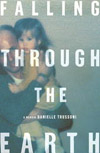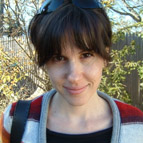- Categories:
Excavating Family History in Falling Through the Earth
In  Falling Through the Earth: A Memoir (Holt), Danielle Trussoni puts her own literary twist on the war memoir: Her father, Dan, was the one who served, but his experiences, and the posttraumatic stress disorder they cause, haunt the entire family, particularly Trussoni. She came to view the Vietnam War as a "hole... created for all of us" after her father's emotional distance led, in part, to her parents' divorce and the division of the children between the two households. (Trussoni went to live with her father, while her siblings stayed with her mother.)
Falling Through the Earth: A Memoir (Holt), Danielle Trussoni puts her own literary twist on the war memoir: Her father, Dan, was the one who served, but his experiences, and the posttraumatic stress disorder they cause, haunt the entire family, particularly Trussoni. She came to view the Vietnam War as a "hole... created for all of us" after her father's emotional distance led, in part, to her parents' divorce and the division of the children between the two households. (Trussoni went to live with her father, while her siblings stayed with her mother.)
Trussoni's father served as a "tunnel rat," considered one of the most dangerous roles in recent warfare. After listening to his stories, finding gruesome war artifacts hidden at home, and watching how, in ways, her father could never entirely leave Vietnam, Trussoni decided she needed to go there herself and crawl through some of the same literal and metaphorical tunnels.
Trussoni lives Providence, Rhode Island, with her husband, Nikolai Grozni, who is also a writer. Before moving to Providence, she lived in Sofia, Bulgaria, where she wrote Falling Through the Earth. The author has worked as a bookseller at Red Oak Books in La Crosse, Wisconsin, and Canterbury Booksellers in Madison, Wisconsin. She currently teaches writing at Boston University. Falling Through the Earth, Trussoni's first book, was awarded the 2005 - 2006 Michener-Copernicus Society of America Award from the Iowa Writers' Workshop.
Falling Through the Earth is a March Book Sense Pick. Bookseller Chris Vietmeier of St. Helens Book Shop in St. Helens, Oregon, described it as a "riveting series of family snapshots, including both those showing the effects on the family of her Vietnam War veteran father and her own visit to Vietnam in hopes of finding understanding. A mesmerizing memoir of life with a combatant father and a daughter seeking his love."
Recently, BTW spoke with Trussoni via e-mail.
BTW: Falling Through the Earth vividly chronicles your father's experiences of firefights and warily slogging through the jungle during the Vietnam War. What aspects of storytelling did you learn from him?
Danielle Trussoni: Dad is a great storyteller, and I think I learned a lot about how to tell a story from listening to him. My father also has a killer sense of humor, an element that may not be wholly present in my book. I spent a lot of time listening to people in bars talk about their lives, and these stories -- which were usually told at the side of a pool table -- shaped my sense of narrative.
BTW: In your "Note to the Reader," you write that you have reproduced these stories as "accurately as possible." In light of the James Frey controversy, what would you say is the memoirist's responsibility regarding accuracy?
DT: I think accuracy is a big responsibility, one that I took seriously. I don't think a memoir is the place to make up events or characters. Writing a memoir was difficult precisely because of this: I couldn't create events simply to satisfy the plot. In some places, it would have made the book better if I had been able to add some fireworks, but that is the limitation of memoir and I honored it. I did change many characteristics of people and places that appear in the memoir (this is also in the "Note" at the beginning of the book), because I thought it wouldn't be fair to some people, especially those who would rather keep their lives private, to put their real names in my book. My mother, for example, is never mentioned by name. She didn't want her name in the book, and I respected her wish.
There will always be contention about family stories. My sister and I compare memories all the time; we often remember the same event quite differently. And there comes a point when you can't allow every perspective into the book. I was estranged from my father during years that I actually wrote Falling Through the Earth, and so I relied heavily on memory, especially the scenes from my childhood. Other parts of the story (his Vietnam experiences, for example) I had documented in my early twenties. I interviewed him, taping some of the conversations. I used these interviews when writing the war scenes, which was very helpful. But still, to paraphrase something Mary Karr said in her New York Times op-ed piece about Frey: Memoirists don't walk through their lives with a camcorder taped to their heads. We rely on memory. Human memory is sometimes imperfect.
BTW: Your father describes the appeal of being a tunnel rat as a "mystery, a test, a challenge." Did you ever feel that way about writing your book?
DT: Absolutely. I think that each of the many, many drafts that I wrote of this book revealed a new challenge. In the first couple of drafts, the process of just getting the material on the page was difficult, and in some ways very painful. Some mornings it was a challenge to get myself to my desk and face the computer. With later drafts, I had different challenges, like transitions between the Vietnam sections and my childhood, the more technical elements of writing.
BTW: Falling Through the Earth has fiction's pacing and dramatic tension, for example, when you describe your father's explorations of booby-trapped tunnels during the war and your own frightening experience of crawling through the tunnels many years later. Was this a goal of yours?
DT: Yes. In my mind, nonfiction can be structured dramatically. I believe that our family stories shape all of our lives, and that in some fundamental sense, we all narrate our lives. I certainly see my life that way.
BTW: Throughout most of your childhood you describe, almost lovingly, the snowfields, frozen rivers, and icy roads of Wisconsin. Does that kind of landscape appeal to you?
DT: To my imagination, Midwestern winters are endlessly appealing; in reality, when I'm back in Wisconsin, it takes about half an hour before I'm running inside for hot chocolate. The cold, frozen world that I associate with my childhood is a beautiful one. I wanted to capture that chilliness in the book.
BTW: The stranger in Vietnam who stalks you, attempts to rob you, and ends up injuring you seems like some kind of metaphorical, terrifying figure right out of a Graham Greene novel. How did you view him?
DT: The man with the aviator sunglasses scared me to death when I was in Vietnam. I have a journal from that trip, and in the journal I had written a series of questions for him: Who are you? What do you want? Why are you following me? What have I done to deserve this? During the trip, I thought of this man as a sort of ghost from the past. Perhaps because I have a somewhat literary way of looking at the world, I saw him very much as a metaphor. But as I was traveling alone, I was worried about my safety as well. A good imagination isn't always an asset. I began to imagine all sorts of reasons that he might be following me. In reality, I'm sure he was interested in getting my wallet more than anything else.
BTW: What are you working on now?
DT: I'd like to continue to write nonfiction. A number of ideas have come up, but I haven't set anything down yet. My father has been very sick lately and I have been going back and forth between Wisconsin and Providence to help out, which has not left me much time for writing. It is ironic that Dad is in the last stages of cancer now, as the book is coming out. He's so proud of it. He has it propped up next to him, and shows it off to whoever stops by to visit. I'm glad that he got to see its publication. --Interview by Karen Schechner


